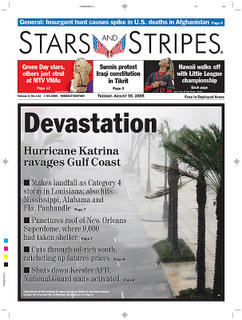It Just Doesn't Ring True
Yesterday's New York Times had an article about Michael D. Brown, entitled "Casualty of Firestorm: Outrage, Bush and FEMA Chief". [
link] In it, Elizabeth Bumiller reports that
One moment of realization [with respect to Brown's potential political liability] occurred on Thursday of last week when an aide carried a news agency report from New Orleans into the Oval Office for him to see.
The report was about the evacuees at the convention center, some dying and some already dead. Mr. Bush had been briefed that morning by his homeland security secretary, Michael Chertoff, who was getting much of his information from Mr. Brown and was not aware of what was occurring there. The news account was the first that the president and his top advisers had heard not only of the conditions at the convention center but even that there were people there at all.
"He's not a screamer," a senior aide said of the president. But Mr. Bush, angry, directed the White House chief of staff, Andrew H. Card Jr., to find out what was going on.
So apparently, the President was "angry" that Brown had not informed his boss, Secretary Chertoff, of key conditions on the ground. Instead, he has to find out from the media about something that has huge human connotations, and therefore huge political connotations, at a time when the press is already excoriating him for being out of touch.
Let us assume for a moment that the events actually occured as described. How then, do you explain Mr. Bush going out of his way to praise Brown very publicly the next day? And why would the President not only praise him, but do so in a way -- using a folksy nickname, "Brownie" -- that had to have been calculated to signal to the world that Brown was a part of the inner circle of trusted Bush folk? There was no reason that he had to do so -- he could very easily have praised FEMA as an agency, or praised the "work that FEMA is doing", or just said nothing about FEMA whatsoever. Instead, he chose to praise Brown. Remember, this is someone responsible for making the President "angry" enough that he assigned his chief of staff -- surely, a very busy man -- to find out what was going on.
I'm sorry, but it just doesn't fit. Either Mr. Bush wasn't really angry on Thursday, and the Bumiller story is fiction, or else he really was angry, but propped Brown up for political reasons. But the latter explanation doesn't make sense, since it seems to be a huge political risk -- clearly, the man isn't doing his job, so why would the President tie his administration's fate to Brown's? Better to let Brown twist, then "reluctantly" fire him as a form of political damage control, right? (Even a moderatle astute Democrat could see that one.)
Since I give the GOP (and Mr. Bush's handlers) alot of credit for political savvy, I can only conclude that what happened was that the President actually wasn't angry on Thursday and genuinely praised Brown on Friday. It was the obliviousness of "My Pet Goat" played out in slow motion all over again. ("Fool me once, shame on — shame on you. Fool me — you can't get fooled again.")
Which is surely why there erupted a political firestorm that threatened to engulf the President. And like 9/11 all over again, the President's spin doctors are furiously trying to recast him after-the-fact as a take-charge kind of guy. He wasn't hopelessly out of touch, he was misinformed by his underlings (just like he wasn't running scared around the country on Air Force One on 9/11, there were credible threats against him). And as soon as he found out, didn't he assign Andy Card to the case (just like he wasn't out of touch, he was advising Vice President Cheney on shoot-to-kill orders)? Hence an anonymous source tips Bumiller that the President was "angry" at Brown's failure to alert Chertoff to something that millions of us saw live on TV; not surprisingly, Bumiller bites and then regurgitates it without even a logic check, let alone any analysis (the extent of her analysis is "If Mr. Bush was upset with Mr. Brown at that point, he did not show it").
Of course, the problem with the spin is that the dates don't work -- Brown's failures were evident before President Bush's first trip to the region, and so obviously, the President had to be angry before then or risk looking even more out of touch. But then there's that pesky "Brownie, you're doing a heck of a job" comment. Hardly what you'd expect from the Boss the day after he learned that the complimentee was grossly incompetant.
And Bumiller is in no mood to debunk the timeline, either. Tellingly, after mentioning the "Brownie" comment, her article quickly shifts from Mr. Bush's public embrace of Brownie to how Brownie got hired in the first place (where, conveniently, a Democrat can share in the blame, since Brownie's confirmation hearing, which Senator Joe Lieberman ran, lasted all of 42 minutes). Of course, that leaves unanswered why Mr. Bush, if he was so "angry", felt the need to embrace Brownie.
Any investigative reporters out there want to look into it?

